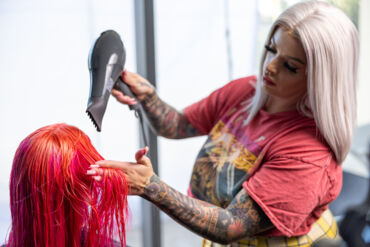How To Save Money On Taxes: A Beginner’s Guide For Salon, Spa Or Barbershop Entrepreneurs
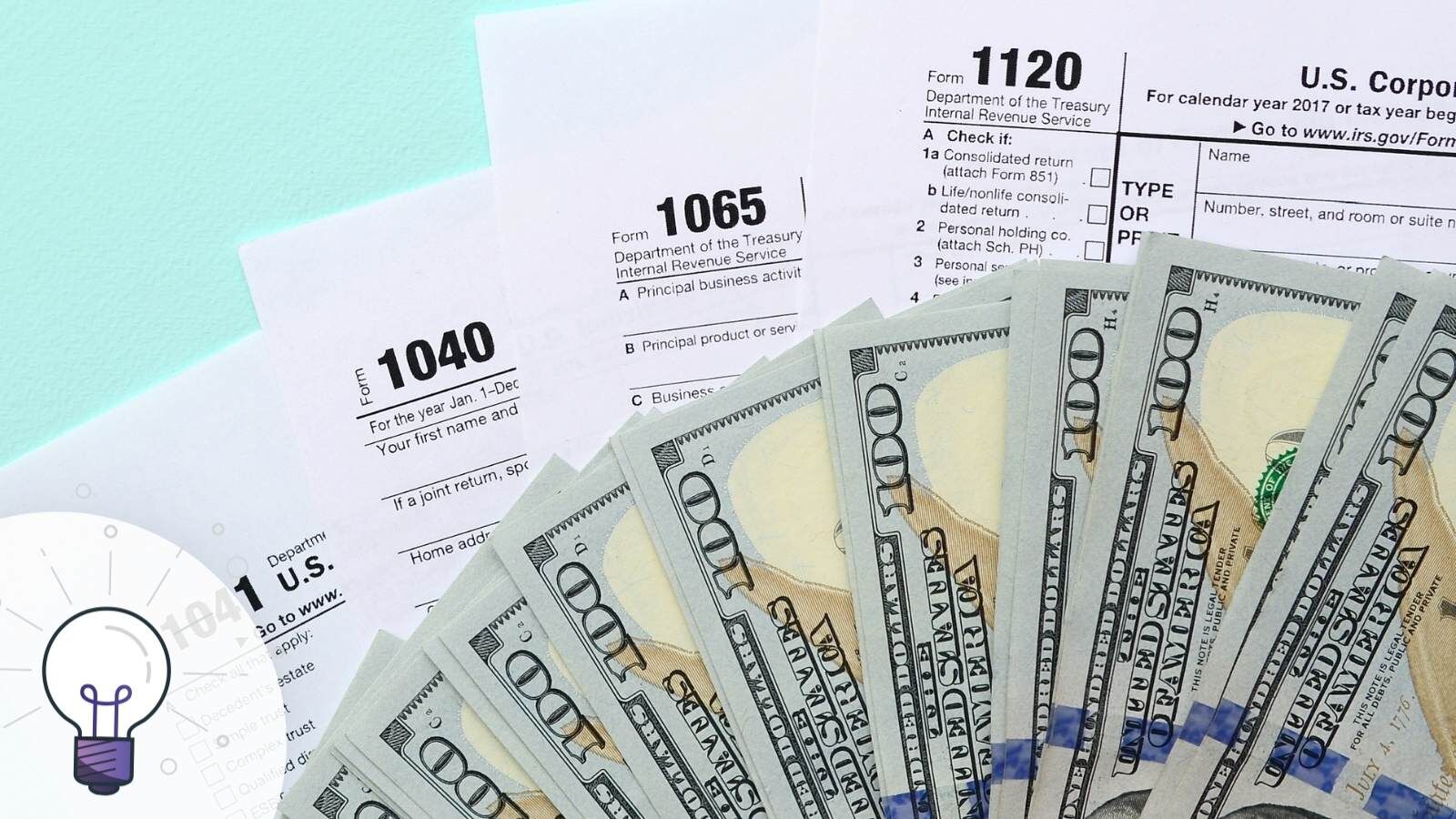

Taxes are one of the few things in life that no one can escape.
It doesn’t matter how big or small your business is and what industry you’re in; if you’re earning income, the government will want its cut.
Now, while taxes are completely mandatory, you shouldn’t pay more than what’s necessary. There are many ways to minimize your tax bill (sometimes by thousands of dollars) so it pays to learn how to save money on taxes.
If you’re about to do your taxes and want to find ways to save, we’ve got you covered. The recently concluded International Spa + Salon Expo (ISSE) had a number of sessions dedicated to helping hair and beauty entrepreneurs save money on spa, salon, and barbershop taxes. We sat in on these sessions and took note of the top financial tips that you can implement.
Before moving forward, it’s important to note that Booksy is not a financial advisor. The following pointers may be considered as general advice, but always consult with a tax professional before implementing anything. Remember that tax laws vary from one country and state to the next, so seek help with a professional who’s licensed in your state and who’s familiar with your line of work.
With that being said, let’s get started on those tax-saving tips!
Select the right business entity and tax status
If you’re doing business in the United States, then you know that each business can fall into the following types:
- Sole proprietorship
- Partnership
- Limited liability company (LLC)
- Corporation (which you can elect to be taxed as an S-Corporation)
How much you’re taxed depends on your business entity and tax status. Sole proprietorships report their business income on their personal tax return and are subject to self-employment tax. Meanwhile, corporations file their own tax returns and don’t have to pay self-employment taxes.
LLCs are typically pass-through entities, so they also report their taxes on their personal tax return. However, LLC business owners can elect to be taxed as a corporation if it makes sense.
As you can see, you have a number of options when it comes to selecting a business entity and the most cost-effective choice depends on how much you’re making and how you run your business (e.g., if it’s just you, if you have employees, contractors, etc.)
Former beauty school grad turned CPA Michelle Cook, who founded Profit That Counts, says that an LLC is a good entity to choose at the beginning. An LLC “is a lot more simple than a corporation. So you can go ahead and start your business as an LLC, and then when the time comes later on down the road and it makes sense to elect to be an S-Corp, it’s a very quick transition.”
How do you know when it’s time to switch to an S-Corp? The answer lies in how much profit you’re making.
“Generally, people benefit from being an S-corp because they can save thousands of dollars every single year in their taxes.
“How much you save depends on what profit is from your business.”
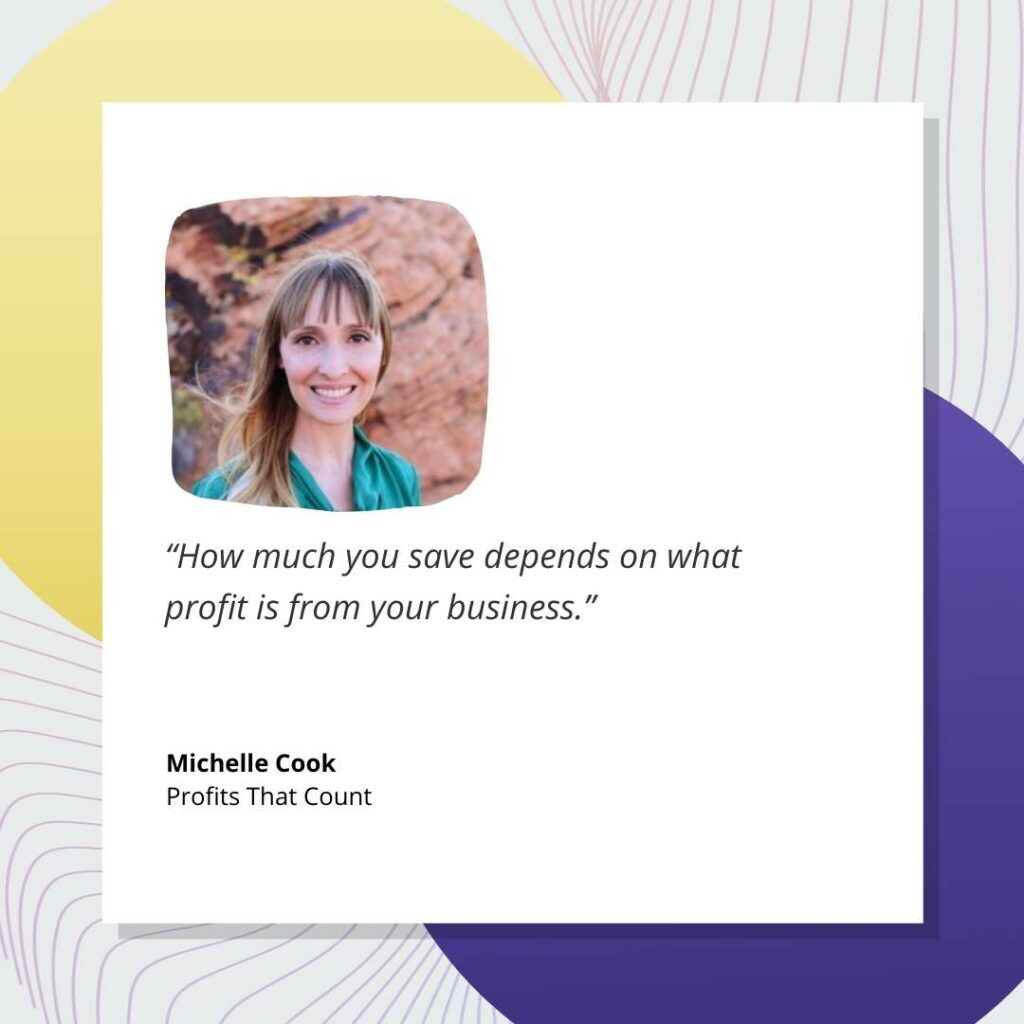
She continues, “If you have $50,000 a year in profit, you’re going to save about $3,000 a year in taxes. If you have a profit of $100,000 a year, then you’re going to save about $10,700 every year just by making this one election.”
This is due to the fact that S-Corps aren’t subject to self-employment tax, which can add 15.3% more to the amount of taxes owed.
S-Corps are more complex, though. They require more record-keeping and are more expensive to run. That’s why it doesn’t always make sense to be a corporation if you’re not earning that much money. When this changes and you start growing your spa and salon profits, then you can look into making the switch.
In any case, it’s worth exploring the world of business entities to figure out the right option.
Note: The benefits of being an S-corp can vary depending on where you’re located. In places like Tennessee, New Hampshire, and New York City, this may not be the best option. Again, be sure to consult with a tax pro to see what works for you.
Learn proper bookkeeping and tax planning
Saving taxes shouldn’t be something that you only think about during tax season.
You need to develop the habit of tax planning throughout the year. Keep a close eye on your income and expenses every month, so you know how much is coming in and calculate the taxes that you might owe down the line.
A big part of doing this lies in bookkeeping.
“Bookkeeping is the foundation of your business,” says Michelle. “If you do your own bookkeeping, then you need to be doing it every month. If you hire someone, make sure they’re doing it every month so you can pull reports and know where things stand.”
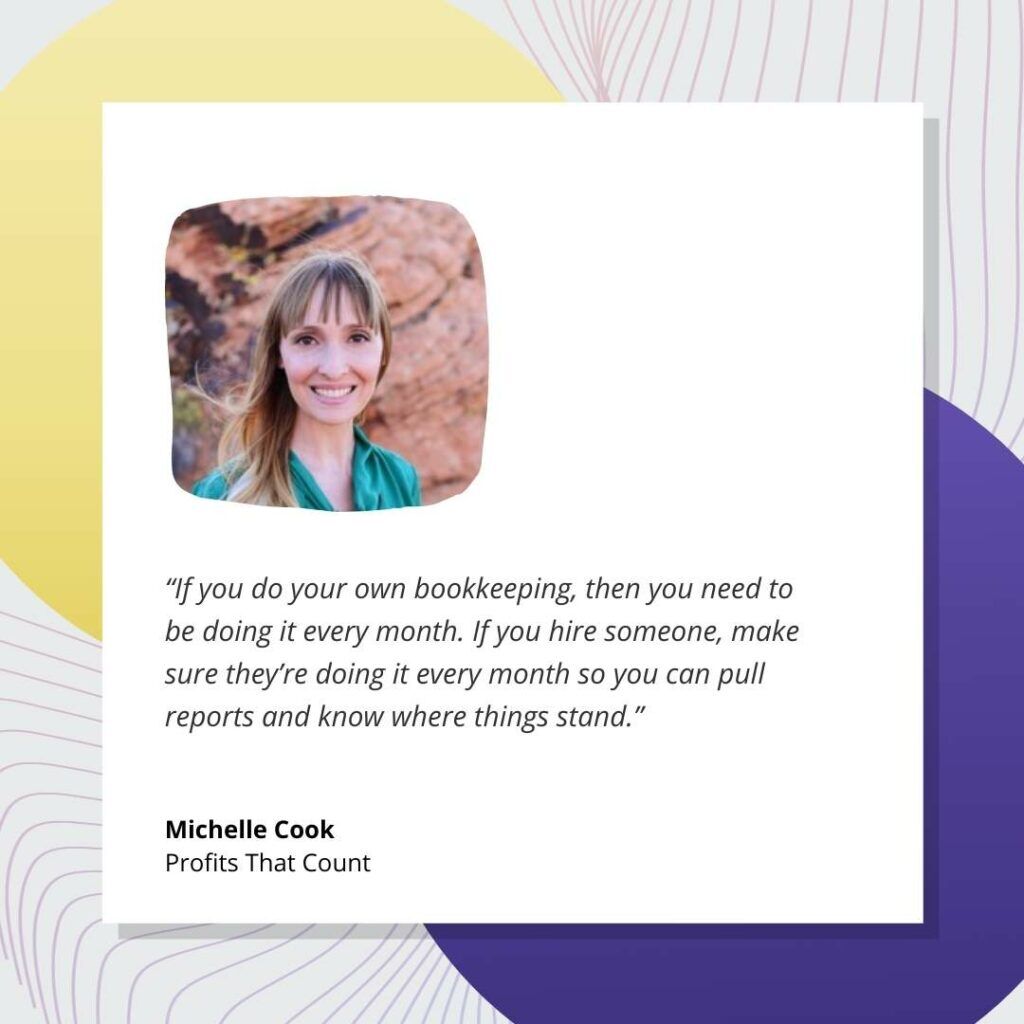
Michelle emphasizes the importance of having a system that keeps you organized so you can stay sane when tax season comes along.
“If you don’t have a system in place, then you’re always going to be running into messes. No one remembers in December what they bought in February.
And if you have a random one-off charge in February, then you’ve got to start hunting around for receipts and trying to figure out what it was.”
She adds, “What you need to do is have your bookkeeping done every month so that when a transaction comes through it’s going to get categorized right away.”
Staying on top of your books also helps you forecast revenue, expenses, and profitability. You can then use that information to plan things like tax deductions.
Take equipment purchases. According to April McDaniel, a CPA at the accounting firm Kopsa Otte, this can be a significant tax deduction if you time it well. Purchasing equipment during a year when you’re not profitable won’t yield much tax savings, but if you do it during a highly profitable period, then you can take advantage of that deduction.
Maximize your deductions
Speaking of which, deducting the business expenses can significantly reduce your tax bill, so be sure to maximize them.
Before we get into the nitty-gritty of deductions, it’s worth looking at what they actually are. During her ISSE session, April shares how the Internal Revenue Service (IRS) officially defines a tax deduction.
The IRS states:
There shall be allowed as a deduction all the ordinary and necessary expenses paid or incurred during the taxable year in carrying on any trade or business.
The keywords, says April, are “ordinary” and “necessary.”
“We have to ask ourselves if an expense is ordinary and necessary. If it’s not, then it’s not tax-deductible.
Driving around in a Lamborghini is not necessary for your salon, for example.”
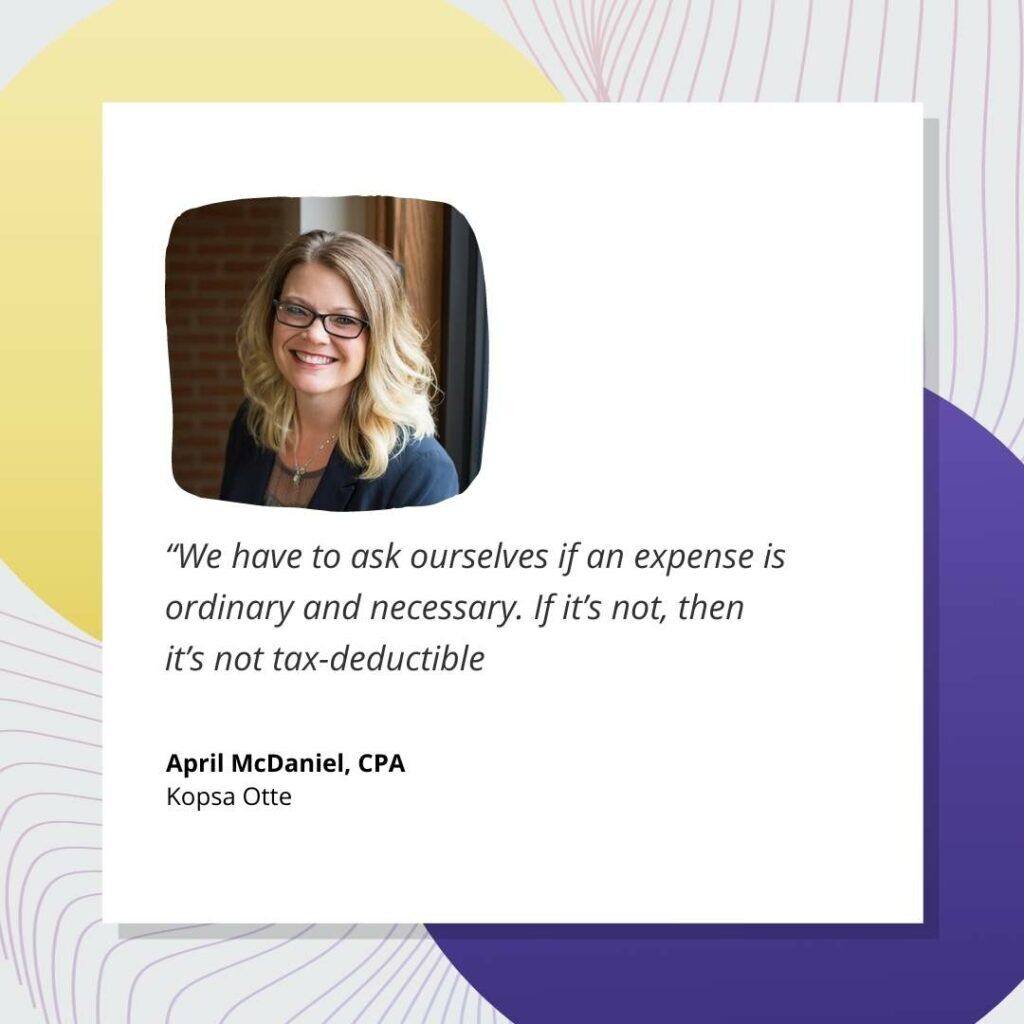
According to her, business owners need to carefully discern which expenses can be deducted and how to do it properly.
The most overlooked salon, barbershop, and spa tax deductions
Everyone in the industry knows that beauty supplies, equipment, and rent are all tax deductible, but there are a few write-offs that you might not be claiming. According to April, here are the deductions that hair and beauty entrepreneurs often overlook.
- Clothing for work. If you damage your clothes while working, determine a Goodwill value for the piece of clothing and write if off on your taxes.
- Weekend getaways. You can combine a getaway with a business trip. Just remember that you cannot deduct the cost of the entire trip. Be sure to track where you go and the business purpose of the trip, and who you’re with.
- Meals for staff. Certain meals may be deducted, but there are a lot of changes going on in this area, says April. Watch this space and ask your accountant.
- Parties for staff. Parties are deductible, within reason. You can’t for example, throw a party every week.
- Art in the salon. You can also deduct art in your salon. Note: if it’s over $2,500 it has to go under depreciation
- Mileage. Be sure to use the right mileage rate for reimbursement. Also, note that not all trips are deductible. Your commute from your home to the salon is NOT deductible. But trips such as going from one salon location to another may be deductible.
- Home office. You can write off your home office as long as you have documentation. Take note of the IRS’ rules around home office deductions. You need to regularly use that part of the home (8-10 hours a week) and it has to be used exclusively for your business. This means your home office shouldn’t be used for personal purposes.
- Stale inventory. Always count your inventory and write it off if the items don’t sell.
- Planned equipment purchases. As mentioned above, equipment expenses for your salon or spa are deductible. Plan accordingly, though. If you’re taking a loss, it’s not a good time to make deductible equipment purchases
- Wrong form of business. This isn’t a deductible in and of itself, but April says having the right entity and structure can save you a lot of money in taxes.
You can also maximize your deductions simply by choosing an accountant that knows your business, adds April.
“It’s important that you find an accountant who knows your business because it’s pretty likely that you’re not getting all the deductions you should be getting… if they don’t know your business.”
Audit-proof your salon
While it’s important to save on taxes, do not resort to shady or illegal means to do so. Be aware of tax laws in your industry and state, and follow them to the letter. The IRS knows how to spot red flags, and if you get audited and penalized, you’ll end up shelling out a lot more money — which defeats the purpose of saving money in your business.
Being careful to avoid audits is particularly important for hair and beauty entrepreneurs.
Why?
Because the IRS is quite leery of salons and barbershops.
“The IRS estimates that salons do not report sales — to the tune of 15% to 40%,” explains April. “They’re very suspicious of your business because you’re a cash business.”
In fact, there is an entire chapter in the IRS’ audit guide that’s dedicated to beauty and barbershops.
So, how can you ensure that your business doesn’t land in taxation hot water? April recommends the following:
Always report the correct amount of income
This should go without saying, but you must report all taxable income. It can be tempting to underreport your income, particularly if a big chunk of your earnings are in cash, but the folks at the IRS are aware of this practice and they know how to spot it.
If your reported income is below industry benchmarks, the IRS may decide to audit your business.
According to April, the IRS “can project retail and service sales based on industry averages… They know that you pay commission (most places do) and they would be able to ask copies of how you pay your people and then they can determine, on audit, what that you service commissions [should be] and calculate your projected total unreported income.”
When the IRS determines that you’ve underreported your income, you’ll not only pay those back taxes, but you’ll be subject to severe fees and penalties.
Don’t even think about underreporting tips
This is related to the point above, but since tipping is a big thing in salons and spas, it’s worth discussing tip reporting separately.
“The IRS looks at tips, too,” remarks April. They know that you’re underreporting tips — a lot of people are.”
She recommends documenting tips carefully and ensuring that those working at your salon report their tips.
“This is not just the employee’s problem. If you are the business owner, it’s your problem,” she adds.
IRS auditors are good at determining unreported tips. According to April, “they know that you’re getting an average tip number, they can look at tips that you’re reporting, and they can look at the industry [averages].”
From there, they can audit your tax return and figure out whether or not you’ve underreported on tips.
Document everything
You can protect yourself from an IRS audit “by having documentation, documentation, documentation,” says April. This means keeping records of your sales reports, tip records, payroll information, and other financial documents.
The following is a list of documents that an auditor can request if you get audited.
- Appointment book, salon menu, and pricing structure
- Salon reports
- Schedules, lease agreements, tip records
- Invoices, mileage logs, meeting agendas
- Bank statements, reconciliations
- Payroll information
- Financial statements and details of balances
- Tax returns
Auditors may also investigate your employment practices, sales and markups, equipment, supplies, and more.
The bottom line? IRS auditors can spot non-compliance from a mile away. Save yourself the headache (and major financial burdens) by doing your taxes right.
Self-audit yourself
Another way to protect yourself from an IRS audit is to have internal controls in place that ensure you stay compliant. According to April, this may involve the following steps:
Implement segregation of duties. Don’t let the same person man the cash register and take the money to the bank, she says. It’s better to have different people do these tasks, as it helps prevent fraud.
Enter your sales daily. Record your sales while they’re fresh in your mind to keep your documentation in check.
Keep an eye on gift certificates and discounts. Some of these can be manipulated to present an inaccurate view of your sales and profits, which can raise red flags with the IRS.
Know your software capabilities and limitations. If you’re equipped with solutions like salon booking and management software, bookkeeping tools, small business workflow software, etc., find out how they can help you track your business and keep better records. As April points out,
“Oftentimes the software that you use has audit trails and ways to check things. So, understand how those things work.”- April

Ready to save money on small business taxes?
Sorting out salon, barber, or spa taxes isn’t fun, but doing it doesn’t have to be a complete nightmare. By knowing the right business practices, diligently tracking your numbers, and partnering with an excellent tax professional, you can make tax season easier and learn how to save taxes in your business.







